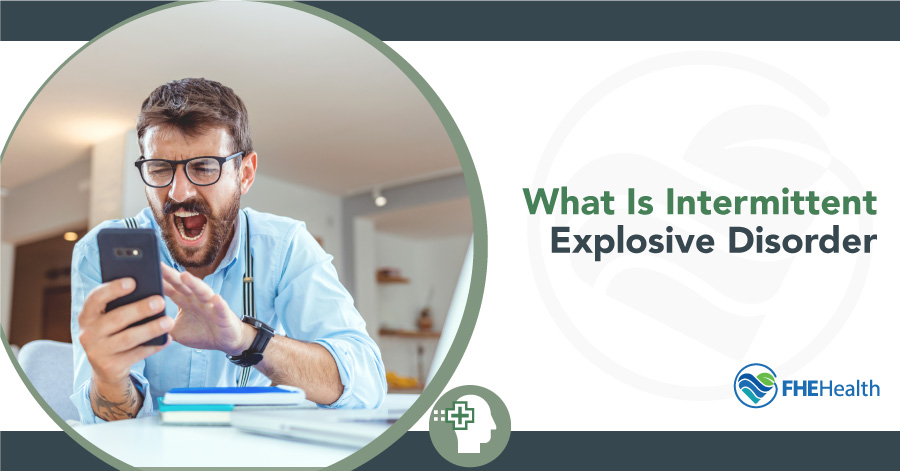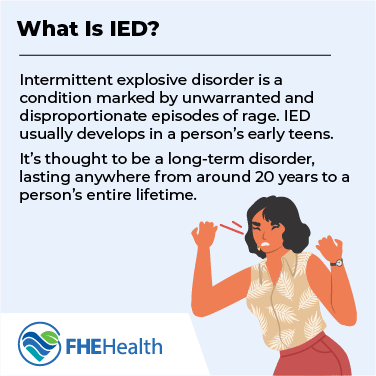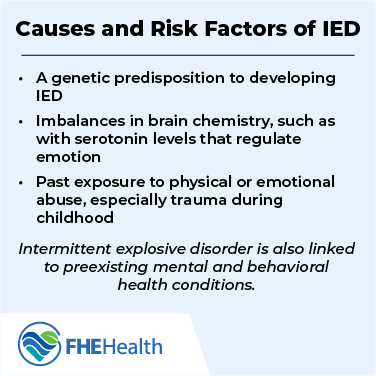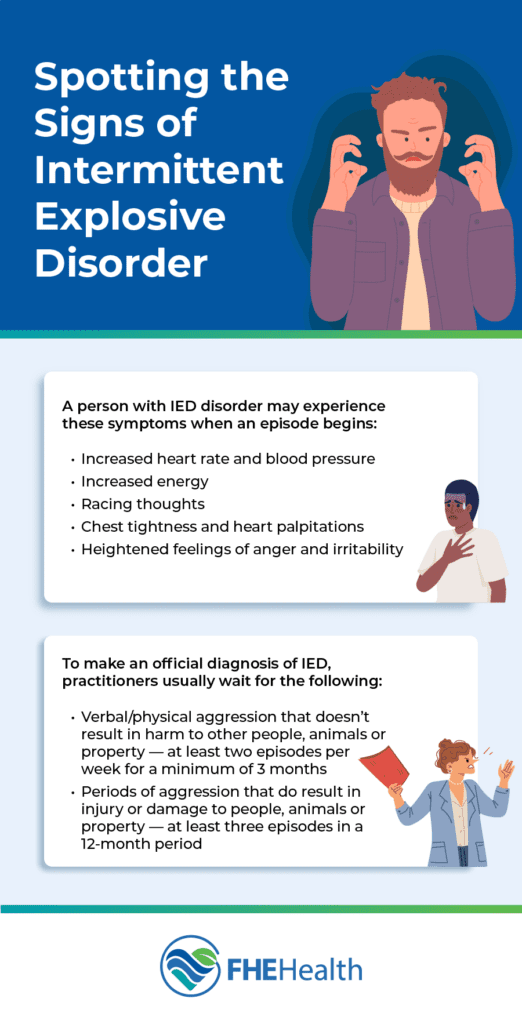
Have you ever seen someone shift from seeming completely fine to violently angry in a matter of seconds? This may be more than just a short temper. They may be living with intermittent explosive disorder, a real condition with significant impact on the lives of people who suffer from it.
In this piece, we’ll break down this lesser-known mental health condition, including what it is and what kind of damage it can have. We’ll also talk about how to get treatment for it and keep the consequences from getting worse.
What Is IED?
 Intermittent explosive disorder is a condition marked by unwarranted and disproportionate episodes of rage. According to the Cleveland Clinic, up to an estimated 7% of all adults experience IED in their lifetimes.
Intermittent explosive disorder is a condition marked by unwarranted and disproportionate episodes of rage. According to the Cleveland Clinic, up to an estimated 7% of all adults experience IED in their lifetimes.
IED usually develops in a person’s early teens, but it can take much longer to be recognized and diagnosed. It’s thought to be a long-term disorder, lasting anywhere from around 20 years to a person’s entire lifetime.
Spotting the Signs of Intermittent Explosive Disorder
The main symptom of IED is intense anger. A person may throw things, pick fights for no reason or engage in road rage. Episodes last for around 30 minutes in most people.
Some IED medical symptoms may show when an episode begins, such as:
A person with IED disorder may experience certain symptoms when an episode begins:
- Increased heart rate and blood pressure
- Increased energy
- Racing thoughts
- Chest tightness and heart palpitations
- Heightened feelings of anger and irritability
To make an official diagnosis of IED, practitioners usually wait for the following:
- Verbal/physical aggression that doesn’t result in harm to other people, animals or property — at least two episodes per week for a minimum of 3 months
- Periods of aggression that do result in injury or damage to people, animals or property — at least three episodes in a 12-month period
Causes and Risk Factors of IED
 As with many mental health conditions, anger disorders like IED can have a variety of causes. Here are few of the most common examples:
As with many mental health conditions, anger disorders like IED can have a variety of causes. Here are few of the most common examples:
- A genetic predisposition to developing IED
- Imbalances in brain chemistry, such as with serotonin levels that regulate emotion
- Past exposure to physical or emotional abuse, especially trauma during childhood
Intermittent explosive disorder is also linked to preexisting mental and behavioral health conditions. According to the National Institutes of Health (NIH), 82% of people with IED have a history of depression, anxiety or substance abuse.
Comorbidities When Living With Intermittent Explosive Disorder
IED is rarely experienced in isolation. Other disorders can share symptoms or occur alongside it. Some examples include:
- Attention deficit disorder or attention deficit hyperactivity disorder
- Oppositional defiant disorder
- Bipolar disorder
- Post-traumatic stress disorder
- Other anxiety and depressive disorders
Essentially, anything dealing with anxiety or depression can occur along with IED, setting off the explosive episodes.
Addiction and IED
Studies have shown that individuals diagnosed with IED are at increased risk for developing substance abuse disorders. This means early treatment of impulsive aggression, especially for those experiencing the symptoms in adolescence, can either prevent or at least delay later development of substance abuse in life.
Should You Seek Help?
IED is marked by anger, but isn’t it common to feel angry?
Yes, but when you have a diagnosable rage disorder, it’s more than just “feeling angry.” Manifestations of explosive intermittent disorder can be extremely destructive to you and those around you. Trying to “just live with” IED can have some serious long-term consequences.
Difficulty Staying Employed
If someone with IED starts having episodes at their job, it can cause problems. If they get in fights with coworkers or supervisors, they may be fired and develop a reputation. When this happens, they can have greater difficulty finding work and supporting their family.
Problems at Home
Violent IED episodes are usually directed at people who haven’t done anything to deserve it. This strains relationships, damages families and results in domestic violence. It can start a cycle of abuse that leads to mental and behavioral health issues among younger family members, perpetuating the cycle of anger.
Legal Troubles
People with IED are at higher risk of being violent, destroying property and causing harm to those around them. The person may face legal consequences after a road rage conflict or domestic violence incident. These legal difficulties can cause other problems in life as well, such as making it difficult to find a job.
Issues Developing and Maintaining Relationships
A person with IED can also have difficulty forming friendships and romantic relationships. The ability to control one’s emotions and act reasonably are important when fostering relationships. Understandably, no one wants to be around a person who’s unpredictable, angry and violent.
Worsened Mental Health and Risk for Addiction
Often, people with mood disorders like IED only become fully lucid after an episode ends. They may then feel intense shame and regret about their behavior. To cope, they may pick up destructive habits like using drugs or alcohol. This is one of the reasons co-occurring disorders are so common.
What Treatment Is Available for Intermittent Explosive Disorder?
Fortunately for those struggling with IED, some effective treatments are available:
Medication
Most treatment plans for disorders like IED will involve a sedative or antidepressant. Fluoxetine (Prozac) is commonly prescribed to regulate chemical imbalances in the brain and help address underlying mental health conditions.
Professional Mental Health Counseling
While medication can be helpful in controlling the symptoms of IED, it shouldn’t be viewed as a permanent fix. One of the most effective long-term treatments is therapy.
Cognitive behavioral therapy (CBT) has become the standard treatment for conditions like IED. In CBT, clients are encouraged to explore specific episodes of their condition and how they felt. They examine the decisions they made and why they made them. The result is a better understanding of how their condition manifests in a specific instance and how to combat it.
Therapy for IED may also include the development of coping mechanisms. For example, learning calming strategies such as breathing exercises may help a person stay in control.
Lifestyle Changes
On their own, lifestyle changes are almost never the answer to a diagnosable mental health condition. However, making healthy lifestyle changes can help support therapy’s goals of keeping you grounded and in control of your emotions.
It may help to increase your intake of minerals such as magnesium, which promotes calmness and helps protect against stress. Getting enough rest at night has also been shown to help stabilize emotions and support mental and emotional wellness.
Getting Help at FHE Health
If you’re trying to navigate life with intermittent explosive disorder, you don’t have to struggle alone. At FHE Health, we offer a range of therapies and services to address mental health issues such as IED. Contact us today and let us help you take back control of your life.







